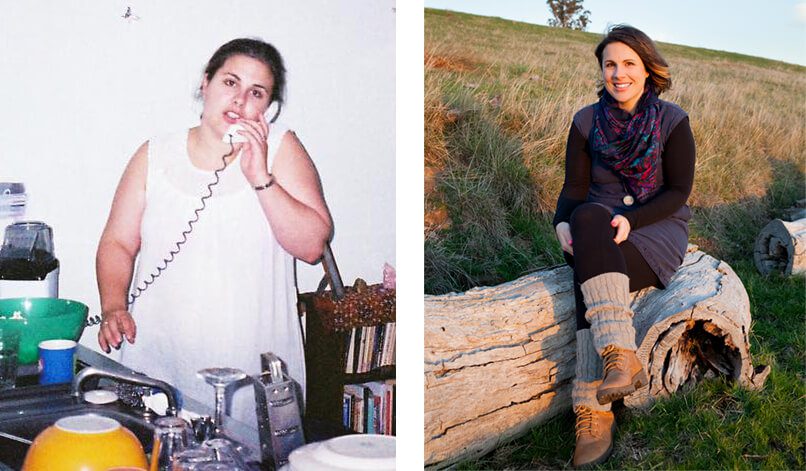Signs of Ms in Women Plant Based Diet
Tired of relapses and reluctant to go on medication, Corinne Nijjer decided to try using a plant-based diet to treat MS. She had no idea how dramatically it would transform her health.
I was born in Victoria, Australia, to a family of farmers. I weighed 10 pounds when I was born—"the biggest baby in the nursery," as I was regularly informed later—and thus began my lifelong struggle with taunting, obesity, and increasingly ill health. By the time I was 18, I was clinically obese for my height. I lived off cakes, biscuits, and candy; I had no energy and required regular naps to get through my school days. By the time I left home and began studying and working, I was chronically constipated, had monthly candida outbreaks, and relied on antidepressants and painkillers.
Master plant-based cooking with forks
COURSE BEGINS JANUARY 4
Worsening Symptoms
At age 22, I was experiencing chronic pain to the point that I could no longer raise my arms above my head, wash dishes, or clean the floors. I was diagnosed with fibromyalgia. I was told that there was no cure and that this would just be my life from now on: heavily reliant on painkillers and anti-inflammatories.
In 2004, when I was 24, I woke up before my morning shift at work and was unable to feel the right side of my face. By midmorning, I could no longer feel my right arm below the elbow. Initially, after reading the CT scan, the doctors thought I'd had a stroke, but the MRI showed multiple lesions on my brain. As a result, I was diagnosed with multiple sclerosis. It felt as if my entire world had imploded. I was terrified for my future. At the time I couldn't believe it: Why would my immune system suddenly start attacking my brain and nervous system? It just didn't make sense to me.
Planting the Seed for Change
Soon after my diagnosis, I received some information in the mail from MS Australia. Mostly, it was glossy pamphlets touting all the latest available drug treatments, such as beta interferons (self-administered injections believed to reduce the frequency and severity of relapses). But I also received two printouts about research by Roy Swank, MD, on the benefits of a low-fat, mostly plant-based diet. I hated the idea of injecting myself, and it made sense to me that something I was doing to my body had been making me sick. But as a smoking, junk food–loving obese person, the thought of drastically changing my entire life seemed impossible.
At my six-month checkup, I asked my neurologist about treating MS with a low-fat, plant-based diet. He told me that there was no scientific evidence of diet having any connection to MS, and that I should eat whatever I wanted. This made me feel that I could go back to the lifestyle that had made me sick.
In 2006, I had been having relapses about every six months, so I attended an MS retreat. Although not 100 percent plant-based, this retreat was based on the research conducted by Roy Swank, with a focus on low-fat, plant-based eating. This was the real beginning of my transition to a plant-based diet, though it still took me another two years to adopt the diet completely.
One day in 2008, I woke up unable to feel my legs or anything below the waist. I was terrified. I didn't know if I would ever regain the feeling, if I'd ever walk properly again, if I'd ever be able to be intimate with my partner again. I had so many questions. I went to the neurologist for steroid treatment. He advised me that if I continued to refuse the medications I would get sicker and sicker until I died. At that moment, I knew I had no choice. I made a new commitment to my health, to healing, to fully following a low-fat, whole-food, plant-based diet.
Happy, Healthy, Symptom-Free
Things began to improve pretty quickly. I noticed that I was no longer chronically constipated; I had more energy; my chronic pain receded; the candida I'd been living with since I was 16 just went away; and slowly I started to lose weight that I'd never been able to lose before. I lost over 55 pounds, and for the first time in my life entered the "healthy" weight range. I felt amazing.
That was 10 years ago this August, and I've never looked back. I am now celebrating 10 years completely free from the symptoms and relapses of multiple sclerosis!
These days I try to run 3 miles every single day, not just for the health benefits but because I actually love it. I never thought I would love moving my body. I never thought I'd be able to move my body effortlessly and free from pain after being diagnosed with MS. I now have two adorable small children, and I can chase after them, climb trees with them, and even take them running with me. Our entire family is whole-food, plant-based and thriving! Next year I turn 40, and I honestly can't wait to turn 40 in the best health of my life.
Ready to get started? Check out Forks Meal Planner , FOK's easy weekly meal-planning tool to keep you on a healthy plant-based path.

Healthy eatingshouldn't be a hassle

With weekly meal plans, Forks Meal Planner takes the hard work out of making nutritious meals the whole family will enjoy.
Get meal planner
Discover finger-lickin'good food with our app

Get inspired! Our chefs add delicious new plant-based recipes every week to keep mealtime exciting and satisfying.
Get the recipe app
Signs of Ms in Women Plant Based Diet
Source: https://www.forksoverknives.com/success-stories/plant-based-diet-to-treat-ms-no-relapses/